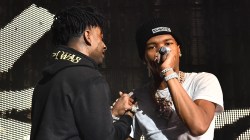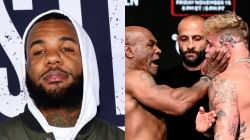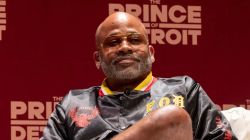No one is more prepared than Puerto Rock. Having perfected rhyming and performing through an incredible six year mic-rocking apprenticeship – from laying bars with hip-hop’s most respected artists and producers to touring across the country – Puerto Rock spikes a sea-soned artist’s mastery with new artist vitality on his debut Epic album. “It’s a pour-it-on-the-rocks album, a bang-out album,” Puerto Rock aptly describes his first opus. The cut “Warning,” with its siren-alarming hook (sung by Caridad), is a cyclone of bass and a taut string of aggressive, incisive rhymes. “I’m giving you your last warning because Puerto has to have his share in the industry-so make way,” the determined Puerto Rock ex-plains. The single “Bang Out,” produced by G-Bo the Pro (who also produced “Warning”), per-fectly accents Puerto Rock’s unrelenting verbal lashing with a sparse and invasively unforget-table track. “I begin it by saying, ‘The next time you hear me jiggy on CD, next time you see me on DVD.’ That ‘s my whole intro to the whole world. Some people heard about me, some people know me, some people just seen me, so now, it’s like the whole picture will be put together.” Though Puerto Rock is releasing his first album, quite a few people have already seen or know about him. Puerto Rock is a regular actor in one of the most successful and renowned advertising campaigns in television history, Budweiser’s “What’s Up” commercial series. With the campaign’s 1999-2000 football season debut, Puerto Rock, along with the rest of the “What’s Up” guys, has become a veritable pop culture icon.
Born and raised as Jimmy Perez, young Puerto Rock was the quintessential b-boy, breakdancing on flattened cardboard boxes outside of the Spanish Harlem Wagner projects, in which he was born and raised. “Spanish Harlem Wagner projects, in which he was born and raised. While receiving his education in Utica, New York, the breakdancing child prodigy audi-tioned for several dancing open calls and after besting hundreds of agile hopefuls, began per-forming on area stage. Known even then as Puerto Rock, he became a fixture in hip-hop culture’s formative, foundational years and was featured in newspapers for his prodigal talent and even held his own classes in which he taught other kids how to break dance. His brother Killer, cognizant of Puerto Rock’s tastemaking impact in hip-hop encouraged him to embrace another element of hip-hop, MCing. The progression was incredibly natural. “I felt like, I love the music so much that I’m going to write it now, I’m just going to be an artist now,” Puerto Rock remembers.




